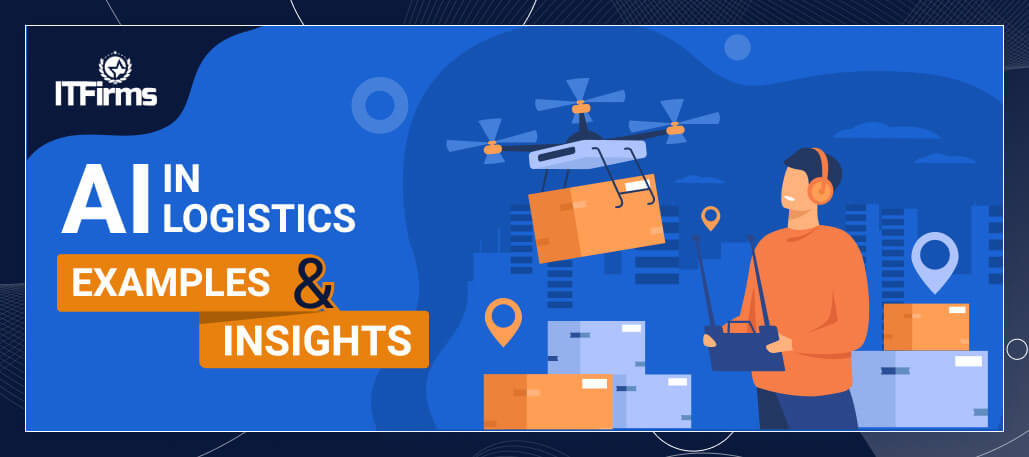
Can AI Help in Improving Logistics?
We’re illustrating the machine learning use cases in logistics and supply chain management!
Artificial Intelligence in Logistics is often used to predict the demand and calculate potential sales. AI can modify orders, re-route in-transit goods to warehouses to desired destinations. AI in logistics delivers’ powerful optimization capabilities, capacity planning, improves productivity and quality, lowers costs and fosters safer working conditions. The planning and agility in logistics make way for better service and reduce the logistics costs. Warehouse automation Systems are a relevant example here that provides an opportunity to conquer a lot of time.
Artificial Intelligence = Augmentation + Automation
AI in logistics and supply chain has the potential to stir the top-line and bottom-line value. One of the Gartner Analysts, at Gartner’s Supply Chain Executive Conference; bifurcated artificial intelligence into two majors: Augmentation + Automation;
- Augmentation – It assists humans in day to day tasks. It makes use of a virtual assistant, data analysis, software solutions;
- Automation – It makes things work autonomously without human intervention.
How is AI applicable in supply chain management activities?
- AI-enabled chatbots perform day to day operational procurement.
- AI-enabled virtual assistants are used to negotiate trivial conversations.
- Set and send actions to suppliers
- Place requests for purchasing
- AI-enabled machines receive/file/document invoices and payments or order requests.
- Machine Learning is applicable to supply chain management can help revolutionize agility, optimize supply chain decision-making.
- ML can optimize the delivery of goods, balance supply and demand without human analysis.
A forecasting engine enabled with machine learning can help eradicate supply flaws like overstocking or understocking for any consumer-based company or retailer.
Inventory Management in Supply Chain
Supply chain management relies on proper warehouse and inventory-based management. It is also a driving force behind autonomous vehicles, accounting for faster and accurate shipping, reducing the lead time and transportation expenses, Plus, adding environmentally friendly operations.
NLP in Supply Chain
Natural language processing deciphers big data. It builds big data sets, audits untapped information and compliance actions between buyer-supplier bodies.
AI in Value Chain
Supply retail management actions like supplier assessments, audits and credit scoring. SCM is often considered a part of the value chain that is heavily impacted by implementing artificial intelligence. It reduces human effort and automates work, which implies fewer people have to be present for manual supervision.
Machine Learning In Supply Chain
Under or overstocking can be challenging that can bring the entire supply chain management strategy to rocks. Bringing in some machine learning and artificial intelligence can turn out to be a saviour of warehouse management, helping out in the faster analysis of big data.
AI To Track and Analyze Warehouse
AI is often used in computer vision systems to automate the barcode reading process and fasten it. It monitors the warehouse, tracks employee attendance and identifies breaks.
AI in Logistics for Demand Prediction
AI-enabled machines quickly estimate the raw material requirement. These predict the future demand; this helps reduce wastage and make informed business decisions. It helps in removing data volume complexity and optimize inventory control. Reinforcement learning involves letting AI predict the demand vs. supply gap but considering how this new technique will integrate with the existing inventory management system.
AI in Tracking Driverless Cars
Driverless cars are being built bases on logistics route optimization using machine learning for various locations such as residential communities, industrial parks, airports etc. AI also makes it easy to get personalized tracking data and customize delivery.
Conclusive: Deriving the benefits of AI in Supply Chain Management
Implementing artificial intelligence in warehouse and supply chain management helps automate the warehousing, automate vehicles, streamline smart roads, predict demand, reduce overall cost, implement intelligent back-office operations and improve customer experience.
Top artificial intelligence companies work to develop AI-enabled software to optimize logistic operations and reduce time to perform a task. These further provide users with predictive optimization, advanced forecasting. Smart road systems work upon AI-based algorithms that offer an opportunity to track the road conditions and predict situations on the highways.
We’re up to discuss AI, machine learning in the supply chain. Our team of experts can turn out to be the best AI developers for you. Reach out to us for all related queries.
